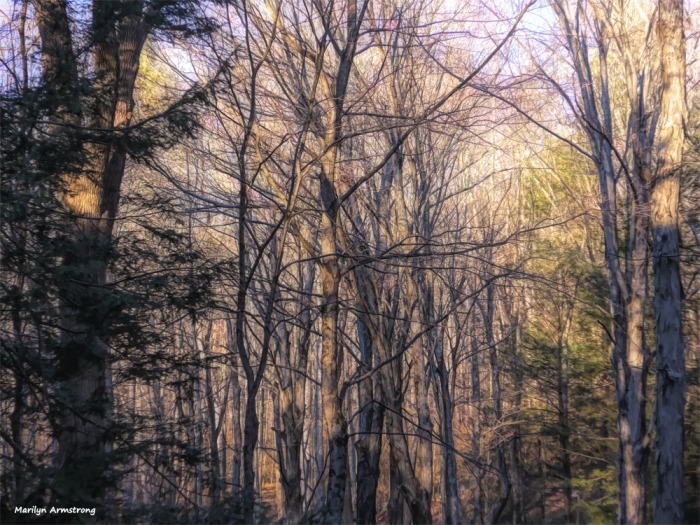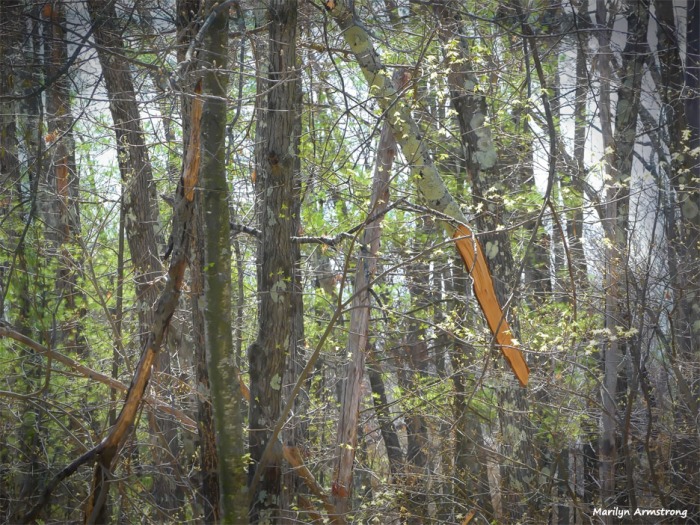I grew up in a semi-rural nook in the middle of Queens, New York. The city had surrounded us leaving a tiny enclave walking distance from the subway.
The house was more than a hundred years old. It had been changed by each family who had lived there, so much that I doubt the original builder would have recognized it. From its birth as a 4-room bungalow in the 1800s, by 1951 it had become a warren of hallways, staircases and odd rooms that could be hard to find.
It sat at the top of a hill amidst the last remaining mature white oaks in New York, the rest having fallen to make masts for tall ships. The shadows of the oaks were always over the house. Beautiful, huge and a bit ominous. Some of the branches were bigger than ordinary trees. I remember watching the oaks during storms, how the enormous trees swayed. I wondered if one would crash through the roof and crush me.
I was four when we moved into the house, five by summer. When the weather grew warm, I was told to go out and play. Like an unsocialized puppy, I had no experience with other children, except my baby sister and older brother and that didn’t count. Now, I discovered other little girls. What a shock! I had no idea what to do. It was like greeting aliens … except that I was the alien.
First contact took place on the sidewalk. We stood, three little girls, staring at each other. First on one foot, then the other, until I broke the silence with a brilliant witticism. “I live up there,” I said. I pointed to my house. “We just moved here. Who are you?” I was sure they had a private club into which I would not be invited. They were pretty — I was lumpy and awkward.
“I’m Liz,” said a pretty girl with green eyes. She looked like a china doll, with long straight hair. I wanted that hair. I hated mine, which was wild, curly and full of knots. She gestured. “I live there,” she pointed. The house was a red Dutch colonial. It had dark shutters and a sharply pitched roof.
A dark-haired, freckle-faced girl with braids was watching solemnly. “I’m Karen,” she said. “That’s my house,” she said, pointing at a tidy brick colonial with bright red geraniums in ornate cement pots on both sides of a long brick staircase. I’d never seen geraniums or masonry flower pots.
“Hello,” I said again, wondering what else I could say to keep them around for a while. I’d never had friends, but something told me I wanted some. We stood in the sunlight for a while, warily eyeing each other. I, a stranger. I shuffled from foot to foot.
Finally, I fired off my best shot. “I’ve got a big brother,” I announced. They were unimpressed. I was at a loss for additional repartee. More silence ensued.
“We’re going to Liz’s house for lemonade,” Karen said, finally. Liz nodded. They turned and went away. I wondered if we would meet again. I hadn’t the experience to know our future as friends were inevitable.
 Summer lasted much longer back then than it does nowadays. By the time spring had metamorphosed into summer, I had become a probationary member of The Kids Who Lived On The Block. I did not know what went on in anyone else’s house. I imagined the lights were bright and cheerful in other houses. No dark shadows. No sadness or pain except in my scary world where the scream of a child in pain was background noise, the sound of life going on as usual. Behind it, you could hear my mother pleading: “Please, the neighbors will hear!” As if that was the issue.
Summer lasted much longer back then than it does nowadays. By the time spring had metamorphosed into summer, I had become a probationary member of The Kids Who Lived On The Block. I did not know what went on in anyone else’s house. I imagined the lights were bright and cheerful in other houses. No dark shadows. No sadness or pain except in my scary world where the scream of a child in pain was background noise, the sound of life going on as usual. Behind it, you could hear my mother pleading: “Please, the neighbors will hear!” As if that was the issue.
Across the street, Karen’s mother was drinking herself into a stupor every night. The only thing that kept Karen from a nightly beating was her father. He was a kindly older man who seemed to be from another world. As it turned out, he would soon go to another world. Before summer was ended, Karen’s father died of a heart attack and after that, she fought her battles alone.
In the old clapboard house where I thought Liz led a perfect life, battles raged. Liz’s father never earned enough money and their house was crumbling. It legally belonged to Liz’s grandmother. Nana was senile, incontinent and mean, but she owned the place. In lucid moments, she always reminded Liz’s dad the family lived there on her sufferance. Where I imagined a life full of peace and goodwill, there was neither.
A lovely neighborhood. Fine old homes shaded by tall oaks. Green lawns rolling down to quiet streets where we could play day or night. I’m sure the few travelers who strayed onto our street, envied us.
“How lucky these folks are,” they must have thought, seeing our grand old houses. “These people must be so happy.”
I have a picture in my album. It’s black and white, a bit faded. It shows us sitting in Liz’s back yard. I’m the tiny one in the middle. A little sad. Not quite smiling.
We envied each other, thought each better off than ourselves. It would be long years before we learned each other’s secrets. By then, we’d be adults. Too late to give each other the comfort we’d needed as we grew up. Lonely in our big old houses, all those years ago.
Categories: #Writing, Friendship, Life, Marilyn Armstrong





Beautiful post.
LikeLiked by 1 person
If my home life hadn’t been so bad, it would have been a wonderful time. As it was, there was a lot of wonderful in it. Unfortunately, I did eventually have to go home. We all did and it wasn’t pretty. Those were the “good old days” when beating up your kids was quite the thing to do.
LikeLiked by 1 person
Not like “Ozzie & Harriet”, eh?
LikeLike
Behind closed doors.
LikeLike
Ruth, love the song. Applicable to our lives in so many ways.
LikeLiked by 1 person
I think you were a cute little girl.
Leslie
LikeLike
With braces, glasses, and frizzy hair. But the future was there 🙂
LikeLiked by 1 person
🙂
LikeLike
Marilyn, we lived so close to each other — all those years ago. Wonder how things wudda gone if we’d met?
Your neigherbood was viewed with awe by the folks in “Bricktown” – my neighborhood.
LikeLike
Marilyn — after braces, glasses and frizzy hair — YOWZAH!
LikeLike